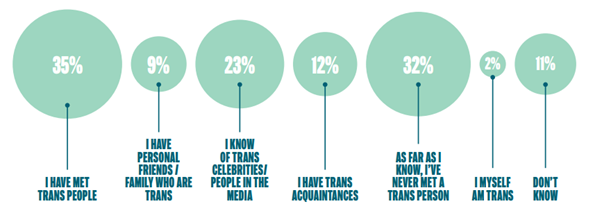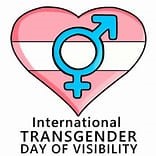Transgender Day of Visibility
31 March is International Trans Day of Visibility. This day is dedicated to celebrating trans people whilst also raising awareness of the discrimination, prejudice and bigotry faced by trans and non-binary people across the world. Trans Day of Visibility also provides the opportunity to work together to make trans people feel seen, understood, and protected.
On Trans Day of Visibility, let’s take time to recognise and applaud the people who live authentically as their true selves with bravery. Let’s celebrate their resilience in the face of the discrimination and transphobic abuse peddled in right-wing media and social media.
Trans Day of Visibility is an important reminder that all people deserve to be treated with dignity, regardless of gender identity or expression. It is a time to celebrate diversity and to work towards a world in which all people are accepted, respected, and valued for who they are.
You can read a trans person’s reflections on Trans Day of Visibility here
Trans visibility
Stonewall produced their Rainbow Britain report in November 2022 based on a survey of over 2000 people carried out by Ipsos. From this survey, less than 2% of respondents said that they were trans.
The following diagram shows the trans connections of people surveyed.

Another interesting set of results filters this by age with older generations having more opportunity to have met a trans person over time, and younger generations having more opportunity as a consequence of visibility. Fundamentally, younger people are more likely to have deep connections with trans people which reflects an increased visibility of trans people.
You can read the full report here or www.stonewall.org.uk/resources/rainbow-britain-report-2022
Another important piece of work by Stonewall is their Ban Conversion Therapy campaign. Conversion therapy aims to erase or remove visibility of trans people as well as lots of other LGBTQ+ people. As such, it is crucial to think about it on Trans Day of Visibility. For more details of the campaign as well as a thought-provoking film, visit Ban Conversion Therapy | Stonewall
What do we do?
The Vale of Glamorgan Council is committed to being a safe, inclusive and welcoming place for people to live, work and enjoy.
We recently held a public consultation through the Participate Vale portal on the Transgender Toolkit for Schools. Consultation was also held with schools, governors, staff networks, and groups including the Equalities Consultative Forum.
We have a Transitioning at Work resource and Q&A on trans issues. You can find these by searching on Staffnet.
We offer a range of equality and diversity courses on iDev including Trans Awareness and Gender Identity that you can access at any time to develop your knowledge and understanding, and help contribute to a more inclusive workplace.
What can you do?
Be a visible ally. You could join GLAM, the Vale of Glamorgan Council’s staff network for LGBTQ+ staff and allies. You could wear a rainbow lanyard or badge. You could include your pronouns in your email signature – this can make it easier for others to also share their pronouns.
You could celebrate Trans Day of Visibility by listening to trans podcasts, reading works by trans authors, watching documentaries about trans people, and learning more about trans people across the world. There are some great ideas here
Here are some other suggestions –
Respect names and pronouns - Do not ask a trans or non-binary person what their "real" name is. Respect the name and pronouns they have asked you to use. If you make a mistake, simply apologise, correct yourself and move on. If you're not sure what pronouns to use for someone, it's okay to ask — but share your own pronouns too.
Avoid assumptions - Trans and non-binary people do not all look a certain way, and you do not have to look a certain way to be a certain gender. A person's gender expression – i.e. their clothes, voice, mannerisms, or other aspects of their appearance – may not always reflect their gender identity in the way you might expect.
Listen and trust trans people on their identities and experience - A trans or non-binary person is the expert on their own experiences. There is no one "right" way to be trans; every trans person has a unique experience. Some trans people experience gender dysphoria; others do not. Some trans people want to medically transition; others do not.
Support trans people using the bathrooms they wish to use - Supporting and advocating for gender-neutral bathrooms is a great way to be an ally. Gender-neutral bathrooms can be a safer option for trans people who are afraid of experiencing transphobia in binary bathrooms; they are also inclusive of non-binary people.
Be careful about confidentiality and "outing" - Some trans people feel comfortable telling others about their gender history; some do not. If someone comes out to you as trans or non-binary, do not share this information with others without their consent. Let them choose if and how they want to tell other people.
Challenge transphobia - If you hear transphobic language or jokes, call them out. If you hear someone misgendering a trans or non-binary person, correct them and make sure they know what the right words to use are.

The Council work extremely hard to ensure that we offer a safe and enjoyable place for LGBTQ+ people to work and to ensure that the Vale of Glamorgan area is a positive and nurturing environment therein. If you would like to get involved in this, or if you have any suggestions for how to make things better, please contact GLAM, our LGBTQ+ Staff Network.
There are also some useful and interesting courses available for all staff on iDev.
If you are concerned about discrimination or harassment, or want more information about how to report it, please refer to the Vale of Glamorgan Council’s grievance policy.